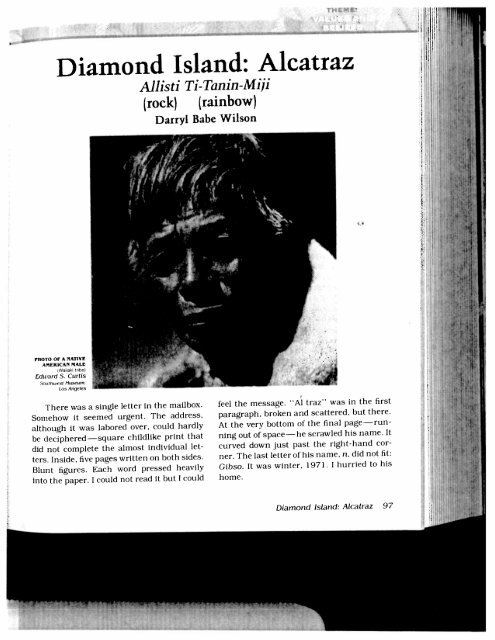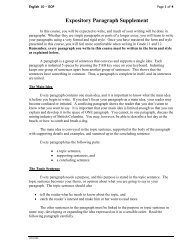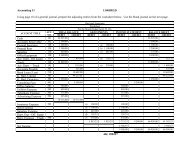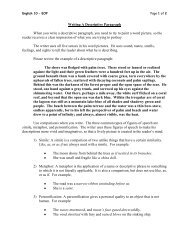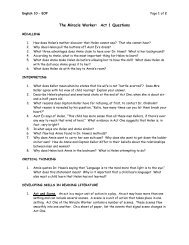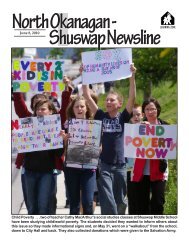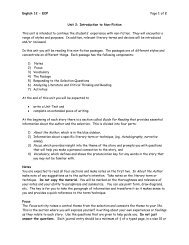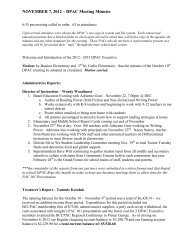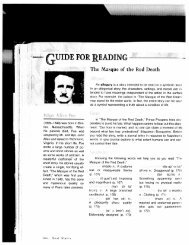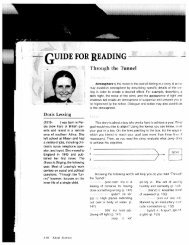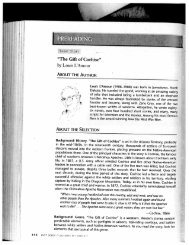You also want an ePaper? Increase the reach of your titles
YUMPU automatically turns print PDFs into web optimized ePapers that Google loves.
home.<br />
‘ hwest I’luseum<br />
. —<br />
-<br />
—--<br />
he deciphered—square childlike print that<br />
although it was labored over, could hardly<br />
Somehow it seemed urgent. The address.<br />
did not complete the almost individual let<br />
ters Inside, five pages written on both sides.<br />
into the paper. I could not read it but I could<br />
Blunt figures. Each word pressed heavily<br />
I’IIOTO OF A NATIVE<br />
Eduard S. Curtis<br />
AflKICAN IALE<br />
F here was a single letter in the mailbox.<br />
WaIIak tnbe)<br />
Los Angeles<br />
feel the message. A1 traz” was in the first<br />
At the very bottom of the final page—run<br />
paragraph, broken and scattered, but there.<br />
ning out of space—he scrawled his name. It<br />
curved down just past the right-hand cor<br />
Gibso. It was winter, 1971. 1 hurried to his<br />
ner. The last letter of his name, n. did not fit:<br />
<strong>Darryl</strong> <strong>Babe</strong> <strong>Wilson</strong><br />
(rock) (rainbow)<br />
Diamond Island: Alcatraz<br />
Allisti Ti Tanin Miii<br />
Diamond Island: Alcatraz 97
its timelessness.”<br />
adj.: Independent (p. 102)<br />
The ongoing force of a moving<br />
(O tan’ ms)<br />
Island: Alcatraz.”<br />
quality of being fragrant or<br />
(red’ ‘I ns) n.: The<br />
Educated at the University<br />
96 Short Stories<br />
suggests, the interviews deal<br />
preciousness and precious in<br />
viewed Native Americans from<br />
Barrow, Alaska, to the Mayan<br />
from the Earth. As the title<br />
Native American, Wilsoh has<br />
his people. He has also inter<br />
the University of Arizona. As a<br />
Peninsula for his book Voices<br />
and short story writer. About<br />
perative that we [Native Amer<br />
icans] write our history and we<br />
remind American society that<br />
his heritage he writes, “It is im<br />
is a widely recognized poet<br />
of California at Davis, <strong>Wilson</strong><br />
with our ecological problems.<br />
Arizona, where he teaches<br />
history that is timeless in its<br />
a long and beautiful history, a<br />
we do, in fact, own a history,<br />
(mO men’ tam) n.:<br />
Native American studies at<br />
written about the struggles of<br />
federal prison (1934—1 963). In <strong>Wilson</strong>’s words, “it is time to give the<br />
a significance that is much different from its identity as the site of a<br />
island of Alcatraz a proper identity and a real history.” In a group of<br />
suming (p. 98)<br />
object (p. 98)<br />
Knowing the following words will help you as you read “Diamond<br />
your understanding of its importance.<br />
to discuss how the story added to your knowledge of the island and<br />
Alcatraz.” Then, after reading the story, get together with your group<br />
Keep your group discussion in mind as you read “Diamond Island.<br />
three or four people. discuss what you know about Alcatraz island<br />
sweet smelling (p. 99)<br />
have spent or used by con<br />
(ek spend id) u: To<br />
To Native Americans, Alcatraz island in San Francisco Bay has<br />
(1939— ) lives in Tucson,<br />
I)arvi BiI c<br />
tells a story within the story.<br />
the narrator is also a character in the story. As a character, the nar<br />
times the narrator and sometimes the narrator’s grandfather, whc<br />
of a story are seen. When the author uses first-person point of view,<br />
Point of view is the position or perspective from which the events<br />
rator participates in the events and tells the story using the firstperson<br />
pronoun “I.” The “I” in “Diamond Island: Alcatraz” is some<br />
GUIDE FOR READING -
Grandfather lived at Atwam, 100 miles<br />
east of Redding. California, in a little shack<br />
out on the flat land. His house was old and<br />
crooked just like in a fairy tale. His belong<br />
ings were few and they, too, were old and<br />
worn. I always wanted to know his age and<br />
often asked some of the older of our people if<br />
they could recall when Grandfather was<br />
born. After silences that sometimes seemed<br />
more than a year, they always shook their<br />
silver-gray heads and answered: “I dunno.<br />
He was old and wrinkled with white hair for<br />
as long as I can remember. Since I was just a<br />
child.’ He must have been born between<br />
1850 and 1870.<br />
Thanksgiving weekend. 1989. It is this<br />
time of the year when I think about Grandfa<br />
ther and his ordeal. I keep promising myself<br />
that I will write his story down because it is<br />
time to give the island of Alcatraz a proper<br />
identity and a “real” history. It is easy for<br />
modern people to think that the history of<br />
Alcatraz began when a foreign ship sailed<br />
into the bay and a stranger named Don Juan<br />
Manuel de AvaIa<br />
recorded “Alcatraz’ in a log book in 1775.<br />
That episode. that sailing and that recording<br />
was only moments ago.<br />
Grandfather said that long ago the Sac<br />
ramento Valley was a huge freshwater lake,<br />
that it was ‘as long as the land’ (from the<br />
northern part of California to the southern).<br />
and that a great shaking of an angry spirit<br />
within the earth caused part of the coastal<br />
range to crumble into the outer-ocean.<br />
When the huge lake finally drained and the<br />
waves from the earthquake finally settled,<br />
there was the San Francisco Bay. and there,<br />
in isolation and containing a ‘‘truth,’’ was<br />
Diamond Island (Alcatraz>.<br />
1 observed the “rock” and<br />
L Don Juan Manuel de Ayala (dan hwàn man<br />
wet’ dã a va’ là): An eighteenth cntui SIianht1<br />
explorer who the first Eui opeati to enter San<br />
Francisco Bay.<br />
He told me the story one winter in his<br />
little one-room house in Atwam. It is bitter<br />
cold there during winters. I arrived late in<br />
the evening, tires of m truck spinning up<br />
his driveway. The driveway was a series of<br />
frozen, broken mudholes in a general direc<br />
tioti across a field to his home. The head<br />
lights bounced out of control.<br />
My old 1948 Chevy pickup was as cold<br />
inside as it was outside. The old truck kept<br />
going, but it was a fight to make it go in the<br />
winter. It was such a struggle that we called<br />
it “Mr. Miserable.’ Mr. Miserable and I<br />
came to a jolting halt against a snowbank<br />
that was the result of someone shoveling a<br />
walk in the front yard. We expended ow<br />
momentum. The engine died with a sputter<br />
ing cough. Lights flopped out.<br />
It was black outside but the crusted<br />
snow lay like a ghost upon the earth and<br />
faded away in every direction. The night sky<br />
trembled with the fluttering of a million<br />
stars—all diamond blue. Wind whipped<br />
broken tumbleweeds across his neglected<br />
yard. The snow could not conceal the yard’s<br />
chaos.<br />
The light in the window promised<br />
warmth. Steam puffing from every breath, I<br />
hurried to his door. The snow crunched<br />
underfoot, sounding like a horse eating a<br />
crisp apple. The old door lurched open with<br />
a complaint. Grandfather’s fatigued. cente<br />
narian<br />
brightness—bright although he had but a<br />
single shadeless lamp to light the entir<br />
house. I saw a skinned bear once. It looked<br />
just like Grandfather. Short, stout arms and<br />
bowed legs. Compact physique. Muscularnot<br />
fat. Thick chest. Powerful. Natural.<br />
Old powder-blue eves strained to see<br />
who was out there in the dark. “Ilallo.<br />
2 body a black silhouette against th<br />
: 2. centcgaraan Iseli t. nt-n’ (‘ 211) iidj At least our’<br />
hundred years old.<br />
I<br />
YE)<br />
Sto,ies
lack volcanic glass.<br />
oldnti<br />
ing cup of coffee. Grandfather looked long<br />
the ciniort of his jumbled little bungalow. It<br />
Grandlather stood back and I entered<br />
warmth!<br />
arom<br />
1<br />
ploded from the open door, Coffee.<br />
-.t the man I’m lookin’ for.” Coffee<br />
Then, with a quiver in his voice, he started<br />
waters.<br />
Rainbow[, Diamond Island. In our legends,<br />
were told to go when they searched for a<br />
thought that he might he crying silently.<br />
that’s where the Mouse Brothers, the twins.<br />
always knew it as Allisti Ti-tan in-rniji [Rock<br />
for it. To our people, in our legends. we<br />
ago. Alcatraz, that’s the white man’s name<br />
runs into the sea is where I was born, long<br />
“Alcatraz island. Where the Pit River<br />
telling the story that he wanted me to know:<br />
ic blend. hut it was so good!<br />
good. it was not a fancy Colombian, aromat<br />
father s collections. It was like a museum.<br />
that every part of the clutter had a history—<br />
Everything was very old and worn. It seemed<br />
origin of the earth, like the bent pail filled<br />
Glass Mountain many summers before,<br />
with obsidian<br />
healtrv handshake we huddled over steam<br />
clean, delicate aroma—a perfume. After a<br />
wood. Juniper. cured for a summer, has a<br />
was G)ZY in there. He was burning juniper<br />
sometimes a history that remembered the<br />
the old moon began to tell the story of his<br />
escape from “the rock” long ago. He gath<br />
into purchasing when he was a young work<br />
“just in case.”<br />
at me I think that he was not totally con<br />
vinced that I was there. The hot coffee was<br />
ing man in the 1920s. The radio cost $124. I<br />
got the -dectric company to put a line to his<br />
the episode magnified in mystery when he<br />
think he got conned by that merchant and<br />
recalled that it was not until 1948 before he<br />
and he did not remember to turn it on until<br />
home By that time he forgot about the radio<br />
ness——like a mouse that died then dried to a<br />
stiffness through the years—a redolence of<br />
1958. It worked. There was an odor of old<br />
3, obid1an (b sid’ t n) n.: Hard. daikcoIored or<br />
ered himself together and reached back into<br />
a painful past. The silence was long and I<br />
We were surrounded by years of Grand<br />
He also had a radio that he was talked<br />
The old person in the old house under<br />
4lected newspapers.<br />
3 that he had collected from<br />
ter. We were always told that the ‘diamond’<br />
was a thought, or a truth. Something worth<br />
They brought it back. But it is lost now. It is<br />
end of It A-juma [Pit River}. They fhund it.<br />
long, long ago. They were to go search at the<br />
all our people, everywhere.<br />
said, the ‘diamond’ was to bring goodness to<br />
and it shined, but it was not a jewelry. It was<br />
very much. It was not a jewelry. It sparkled<br />
mond’ on an island near the great salt wa<br />
with every movement. That is why we al<br />
more. Colored lights came from inside it<br />
ways called it [Alcatraz[ AUisti Ti-taniri<br />
Grandfather spoke of a time long past.<br />
words filled with enduring knowledge,<br />
mUL” With a wave of an ancient hand and<br />
of the Pit River country, his pregnant moth<br />
er was taken captive and forced, with other<br />
to Alcatraz in the winter. At that same time,<br />
Some of our people were “removed” to the<br />
Indians, to make the long and painful march<br />
the military was “sweeping” California.<br />
during the winter to Quapa, Oklahoma. Still<br />
Round Valley Reservation at Covelo; others<br />
were taken east by train in open cattle cars<br />
others were taken out into the ocean at<br />
healing treasure for our troubled people<br />
Eureka and thrown overboard into icy<br />
chains to Quapa are still there. Some of<br />
“We always heard that there was a ‘dia<br />
In one of the many raids upon our people<br />
I)esceiidants of those that were taken in<br />
Diamond Island: Alcatraz 99
*<br />
100 Short Stories<br />
4. crevassed (kr vast’) czdj.: Deeply cracked.<br />
scratched and scarred—when Grandfather<br />
left at darkness. Grandmother said that I<br />
in the frozen winter night— round, bright,<br />
had to get home.<br />
clinging as she swam from Alcatraz to solid<br />
Quivering with emotion. he hesitated.<br />
When those old. cloudy eves dripped<br />
often I trembled too. He softly spoke of his<br />
Our cups were long empty; mulls.s (fire)<br />
needed attention. The moon was suspended<br />
tears down a leathery, crevassed<br />
covered with white stubble. ‘I must have<br />
scared.” Grandfather said. crooked. thick<br />
were not just swimming. We were gaining<br />
‘When it was time, we were ready. We<br />
swim around the rock. Every day, my moth<br />
remembered it all. The guards allowed us to<br />
Grandfather said, “I was very small, too<br />
strength. We were learning the currents. We<br />
too.<br />
He trembled. “I do not remember if I was<br />
currents, made it back to Pit River country,<br />
der sticks,” and dark winter nights of a cold<br />
small to remember, but my grandmother<br />
finement, the threat of being shot by “thun<br />
Alcatraz-made-deadly by churning, freezing<br />
ground in night. My Grandmother remem<br />
indicated where “there” was.<br />
River country. A few of those defying con<br />
in the water. .<br />
4 face, and<br />
long silences were between his sentences.<br />
been.”<br />
. somewhere.”<br />
With a point<br />
made it back to land and returned to Pit<br />
broke my mother’s necklace. It is still there<br />
ing of a stout finger southward, Grandfather<br />
memory.<br />
those cast into the winter ocean at Eureka<br />
er swam. Every day, the people swam. We<br />
was a baby and rode my mother’s back,<br />
bered that I pulled so hard holding on that I<br />
fingers rubbing a creased and wrinkled chin<br />
non hen 1 (‘a litornia<br />
5. Mount Shasta slias’ t. A volcanic mountain iii<br />
coyote howled. Far to the west an old coyote<br />
have been trained to believe that it was<br />
Alcatraz. Through Anwricaii propaganda I<br />
not like us. It denies us.’’<br />
ible that there was such an escape from<br />
me wonder about this story. It seems incred<br />
The night was thick. To the north a<br />
The One-as-Old-as-the-Mountains made<br />
escaped. But after I heard that story so many<br />
times. I don’t think so. I think there was a<br />
our people. The truth hides from us. It must<br />
taJ or So Tilt [Medicine Lakej. It hides from<br />
supreme presence beneath starry skies with<br />
must be deep inside Axo-Yet [Mount Shas<br />
“When first I heard about the ‘diamond,’<br />
where that truth is now, Vhere can it be? It<br />
help our people. I don’t think that I know<br />
instructed to get and bring back long ago to<br />
truth there that the Mouse Brothers were<br />
I thought it might be a story of how we<br />
icy freedom all around.<br />
rasped a call to the black wilderness, a<br />
that I “wrote things down on paper.”<br />
reflected, he gathered his thoughts. He knew<br />
barely remembered. For long moments hc<br />
that was so long ago that the mountains<br />
standing. some kind of good thought—or<br />
something.” He shook a white, shaggy head<br />
and looked off into the distance into a time<br />
were not diamonds hut some kind of under<br />
real diamonds on the island. At least I don’t<br />
Grandfather continued. “There was not<br />
again.<br />
appeared. I slammed the top closed. Silence.<br />
Sparks flew up into the darkness then dis<br />
think so. I always thought the diamonds<br />
flnal1’ paused in his thinking. The old castiron<br />
heater grumbled and screamed when I<br />
slid open the top to drop in a fresh log.
,lilrthuted t Joshua Peirc,<br />
SAN FRANUSCO. 1849<br />
freezing temperature as the powerful ocean<br />
and ihe surging rivers merged in chaos. I<br />
impossible to escape from that isolated rock<br />
because of the currents and because of the<br />
was convinced—until I heard Grandfa<br />
dwelled within a different “time,” a different<br />
thers story and until I realized that he<br />
of a ii dural source. In his world, I was only<br />
a forrn infant. It is true today that when<br />
I talk with the old people I feel like rülladu<br />
‘element.” He dwelled within a spirituality<br />
i white man). I feel like some domesti<br />
cated creature addressing original royalty—<br />
knowing that the old ones were pure savage,<br />
south for three nights before we could turn<br />
north. [My people landed at San Francisco<br />
ceeded. “We wandered for many nights. We<br />
hid during the day. It is said that we had to go<br />
born into the wild, free.<br />
traveling at night with no food until they<br />
and had to sneak to what is now San Jose,<br />
could turn northward.[ They [the U.S. Armyj<br />
were after us. They were after us all. We had<br />
In his calm manner, Grandfather pro<br />
Diamond Island: Alcatraz 101
102 5hurt Sloric5<br />
fire because they would see the smoke and<br />
me to her. We cried. I know we cried. I<br />
people. Perhaps a generation approaching<br />
tion and custom and less satisfied to being<br />
We waited for him to holler as was the plan.<br />
We waited a long, long time. Then we heard:<br />
We were close to home. My mother squeezed<br />
found along the river. We could not build a<br />
time for two nights also.<br />
‘There is a small island of mountains in<br />
climbed the highest peak. He was brave. We<br />
were all brave. It was during the sunlight.<br />
toki Tanjan’ [Mount Shasta! Mount Shasta!<br />
North direction!]. Our hearts were happy.<br />
‘Axo- Yet! Axo- Yet! To-Jto-ja-toki! To-ho-ja<br />
shore [possibly the Benicia Straits]. We rest<br />
catch us so we must eat it [fish] raw. At night<br />
reached that place one of the young men<br />
upstream then jumped in. Everybody fol<br />
the great valley [Sutter Buttes]. When we<br />
make mistakes. We headed north for two<br />
nights.<br />
We came to a huge river. We could not<br />
cross it. It was swift. My mother walked far<br />
was there. So was my mother and grand<br />
are to survive as a distinct and autonomous<br />
inal knowledge now more than ever, if we<br />
for many snows now. The volumes of knowl<br />
Grandfather has been within the earth<br />
mother,<br />
to be careful. We had to be careful and not<br />
ed for two days eating dead fish that we<br />
lowed. The river washed us to the other<br />
we traveled again. Again we traveled, this<br />
edge that were buried with him are lost to<br />
my generation. a generation that needs orig<br />
will be more aware, more excited with tradi<br />
ago to forget the tragic episode that could<br />
Axo-Yet (Mount Shasta) are deep. The glar<br />
below: “Axo- Yet! Axo-Yet! To-ho-ja-tokt<br />
An old chief of the Pit River country, “Char<br />
edged. A truth that needs desperately to be<br />
long ago.<br />
and, standing with the sun shining full upon<br />
have been the termination of our nation,<br />
that caused the hunted warrior 140 years<br />
strands that I often identified as “silver.’<br />
yellow—now that I better recall the coars<br />
ing white makes Grandfather’s hair nearl)<br />
him, hollered to a frightened people waitink<br />
seek and locate AlUsti Ti-tanin-mUi within<br />
reveal many truths to this world society that<br />
found and known for its value.<br />
Atwam, during a sparkling winter night<br />
still can’t read it, but if I could, I am sun<br />
Island long ago. A truth that needs to b<br />
is immense and confused in its immensity.<br />
will set us free.” Along with Grandfather, I<br />
It is nearing winter, 1989. Snows upor<br />
an,” and will seek this knowledge.<br />
think that It was a “truth” that the Mouse<br />
the “white man” and the world of the “Indi<br />
Tanjan!”<br />
That beautiful mountain. The landmark<br />
the mountains. Possibly that generation wil<br />
Perhaps the approaching generation will<br />
Brothers brought to our land from Diamond<br />
Grandfather’s letter is still in my files. I<br />
that the message would be the same as this<br />
understood. appreciated, and acknowl<br />
story that he gave to me as the moon listened<br />
and the winds whispered across a frozen<br />
off balance somewhere between the world of<br />
lie Buck,” said often: “Truth. It is truth that
I I\G ) 1111 Si ii ( I P)\<br />
1 ,uld ask Grandfather a question about<br />
.orj what would you ask? Why?<br />
2 .,r ild tell a future generation a story from<br />
yo ir )uth, what would it be? Explain.<br />
3, H v did Grandfather learn the story of his fam<br />
s s ape from Alcatraz—an event that took<br />
p ace en he was a small boy?<br />
4, Accord ng to the story, what does the “dia<br />
mond of Diamond Island represent?<br />
5, lrterpret the narrator’s comment on page 98,<br />
Tht episode, that sailing and that recording<br />
was only a moment ago” What does the com<br />
ment uqqest about the history of Alcatraz<br />
island?<br />
6. Why did Grandfather ask the narrator to visit?<br />
7, In your words, explain why the author’s gener<br />
ation coeds “original knowledge” in order to<br />
survi C.<br />
8. What do people in your culture do to preserve<br />
their heritage—their identity—as a culture?<br />
I<br />
• Al.<br />
11ZLG LHFRAItJRF<br />
1 11<br />
A first person narrator tells mainly what he or<br />
she thinks, feels, and observes. As a result, the<br />
narrators attitudes shape the story. In addition to<br />
communicating his own attitudes, the narrator of<br />
this story also conveys his grandfather’s beliefs<br />
and obseriations. He does this by recording a<br />
story that his grandfather told him nearly twenty<br />
years efore.<br />
1 D ccss two ways in which first-person narra<br />
on rnbles the author to use Grandfather’s<br />
storj most effectively.<br />
2. What does the narrator reveal about his feel<br />
ings toward Grandfather and Alcatraz island?<br />
I<br />
IIII\KIG \I)<br />
I<br />
An author who writes in the first person wants<br />
the reader to know the narrators thoughts and<br />
feelings. Exploring these thoughts and feelings<br />
can provide insight into the author’s motives for<br />
writing a story. In the case of “Diamond Island:<br />
Alcatraz,’ the author is the narrator. What do the<br />
emotions and ideas that <strong>Wilson</strong> expresses reveal<br />
about his purpose in writing ‘Diamond Island: Al<br />
catraz”? Refer to passages from the story to sup<br />
port your answer.<br />
I<br />
THINKING<br />
N1) WiunG<br />
ii SI<br />
What stories do you know that you think<br />
should be preserved for future generations?<br />
Choose one, and write about it in the first person.<br />
Like <strong>Wilson</strong>, you might choose to write about a<br />
story that was shared with you and affected you<br />
deeply. You could also write about a story from<br />
your life, your family, your school, or your com<br />
munity. Try to interview someone who can give<br />
you his or her first-hand observations of the<br />
events in your story. Finally, in your narration, in<br />
clude hints to the reader about your purpose for<br />
writing the story.<br />
J LRNG<br />
Orl IoN<br />
Art. Draw a map of Grandfather’s return to Pit<br />
River country from Alcatraz. In order to begin,<br />
consult a map of the areas described by Grand<br />
father. On your map, illustrate Grandfather’s story<br />
at key locations. For example, you might want to<br />
draw a necklace at the point where Grandfather<br />
pulls at his mothers necklace as they struggle<br />
through the icy currents.<br />
Diamond Island: Akatiaz 10.3
I<br />
4<br />
I—<br />
104 Short Stories<br />
beautiful history” of Native Americans.<br />
our right to exist—a right that was a gift to<br />
The Storytelling Gift For many gener<br />
us from the moment the stars were scattered<br />
ers such as <strong>Darryl</strong> <strong>Babe</strong> <strong>Wilson</strong> have begun<br />
through what <strong>Wilson</strong> calls his “thought<br />
plains it this way: “When it is time for the<br />
prepared to record that thought at the mo<br />
down by word of mouth. More recently. writ<br />
in the vastness and songs were given us to<br />
in hand, place the proper words in the exact<br />
<strong>Babe</strong> <strong>Wilson</strong>’s inspiration comes from his de<br />
Americans to ‘fInd’ us and to acknowledge<br />
sing that awesome power. We must take pen<br />
catraz” was the result of an impulse flitting<br />
processor.” How does this work? <strong>Wilson</strong> ex<br />
story or poem to appear, it does. If I am not<br />
A Writer’s Inspiration Much of <strong>Darryl</strong><br />
A “Lost” History <strong>Wilson</strong> insists that Na<br />
tive American writers “cannot wait for the<br />
to “take pen in hand.” “Diamond Island: Al<br />
DRAFTING<br />
lowed. “Al this point I did not pursue com<br />
ever. “There is always the search for a bet-<br />
put it down in words with enough velocity to<br />
has made itself ‘visible’ enough so that I can<br />
must he on guard to ‘capture’ a thought thai<br />
insure its survival.”<br />
PREWRITNG<br />
sire to preserve what he calls “the long and<br />
sequence. and move this society to awaken.”<br />
came in three parts,” he recalls. The first<br />
portion to appear was the body of Grandfa<br />
ther’s story. Then a period of waiting fol<br />
ations, Native American history was passed<br />
ment of its appearance. then it vanishes. I<br />
The Story Approaches “The manuscript<br />
that “often a story beginning with the clos<br />
Searching for the Better Word <strong>Wilson</strong><br />
patiently waited for more ‘instruction’ from<br />
the element within me that places the words<br />
beginning three pages arrived.”<br />
upon the page. The following morning the<br />
the creation of the story took patience. Yet<br />
Releasing Your Voice As you can see,<br />
Of course, not all stories begin at the be<br />
Beginnings and Endings Once the vari<br />
like allowing a curious fawn to approach, I<br />
idea how or when it would be complete. And.<br />
arrived. <strong>Wilson</strong> began to sense how to fit them<br />
together. He realized that the three pages de<br />
ing line is more effective.”<br />
Atwam formed the story’s beginning. “And<br />
how much more appropriate it is that the be<br />
REVISING<br />
ergy surges through you. .<br />
. , It<br />
is all a mat<br />
out your effort as you rewrite and earth’s en<br />
<strong>Wilson</strong> stresses that when inspiration ar<br />
rives. the writer must seize upon it. “Do not<br />
write, splash your words upon the paper by<br />
pletion of the manuscript—since I had no<br />
scribing Grandfather’s letter and his house in<br />
ginning of the story began at the beginning!”<br />
ginning. <strong>Wilson</strong> points this out by noting<br />
doubt,” he says. “Do not hesitate. When you<br />
ous pieces of “Diamond Island: Alcatraz” had<br />
the bucketful, and sprinkle ideas through<br />
ter of listening to the voice that is within you<br />
whispering. singing. clamoring to be re<br />
narrative. He does revise the language, how<br />
leased, Release it!”<br />
seldom tinkers with the broad outline of a<br />
Danyl <strong>Babe</strong> <strong>Wilson</strong> and “Diamond island”<br />
ONE WRITER’S PROCESS
them<br />
hon a- lie revised it. According to the au<br />
pression s.’<br />
danger<br />
t iin PRci’s<br />
water. .<br />
couraing.’<br />
the5ame telocity that <strong>Babe</strong> Ruth needed to<br />
ents to .vriting, to creating with words, with<br />
trial it’ll toror. Apply yourself and your ted<br />
to .prai trs and hours of pract tie and<br />
authorized to ‘present the story once it has<br />
mother remembered that I pulled so<br />
Every day, my mother swam. Every<br />
Along with his cultural goals. <strong>Wilson</strong> also<br />
have to wonder if the ancient ones of my na<br />
tion would give approval.”<br />
plains. “is that I am not certain that I am<br />
been ‘captured’ and recorded. I constantly<br />
d’ too many words that clutter the<br />
e avs. or for the elimination of<br />
‘One (>1 the greatest problems I live,’ lie ex<br />
unsure ahom it whether to publish a stor\’.<br />
recei ed ;j copy of <strong>Wilson</strong>’s draft and con-<br />
come it. When someone says, ‘This is not<br />
cultur Sometimes this wish makes <strong>Wilson</strong><br />
wish to honor arid preserve Native American<br />
Moving the Reader Much of <strong>Darryl</strong> <strong>Babe</strong><br />
the es ape from Alcatraz.<br />
some if those <strong>Wilson</strong> added to this descrip<br />
thor, these revisions underlined the sense of<br />
discussed was Grandfather’s description of<br />
structor ilso gave <strong>Wilson</strong> advice about revi<br />
Sharpening the Details The class in<br />
your wisdom-bank to use in your future ex<br />
clont cringe in fear. Rather, ask them why it<br />
ally <strong>Wilson</strong> found the comments of his<br />
tributed suggestions and comments. Gener<br />
ati e<br />
.<br />
Advice Helps <strong>Wilson</strong> wrote “Diamond<br />
play iseball.<br />
raw words,’ <strong>Wilson</strong> insists. “Make<br />
inca! n 0nd are an obstacle to clarity<br />
d es a writer find that better word?<br />
ririn lass. Each student in the class<br />
fellow ‘,tudents “very constructive and en<br />
“Do not fear criticism.” <strong>Wilson</strong> says. “Wel<br />
good. this is not clear, this is incomplete,’<br />
is so. Then make the adjustments within<br />
Look at the box. The darkened words are<br />
<strong>Wilson</strong>’s writing is motivated by the author’s<br />
sions. One particular part of the story they<br />
l,,Iar-id:.\hatraz for a university-level cre<br />
were 1_iav baseball. .‘ca be required<br />
. tkt n. get up. sing and dance. If von<br />
other people, too,’ he says.<br />
adnuts to a much simpler motival ion—mno’—<br />
ther indicated where “there” was.<br />
back, clinging as she swam from Alca<br />
With a pointing<br />
of a stout finger southward, Grandfa<br />
We were learning the currents. We had<br />
day, the people swam We were notjust<br />
“When it was time, we were ready.<br />
mother’s necklace. It is stifi there in the<br />
mother remembered it all. The guards<br />
allowed us to swim around the rock.<br />
swimming. We were gaining strength.<br />
to get home.”<br />
too small to remember, but my grand<br />
Grandfather said, “I was very small,<br />
traz to solid ground in night. My Grand<br />
that I was a baby and rode my mother’s<br />
hard holding on that I broke my<br />
timing and it moves me, then I know it moves<br />
We left at darkness. Grandmother said<br />
. somewhere.”<br />
1. Which aspect of his writing does <strong>Wilson</strong><br />
2. Writing Do you usually start your stories with<br />
the beginning, middle, or end? Try taking a<br />
story that you have already written and rear<br />
ranging the pieces in a different order so that<br />
effect this has on the story.<br />
the end is now the beginning. Describe what<br />
change the most during the revision stage?<br />
ing the reader. “Wheneer I reread sonic<br />
One Writer’s Process 105


